Happy Thursday! We successfully convinced Declan to keep all Bears Hard Knocks content out of the In The Zeitgeist section, but in exchange, we had to let him include one highlight in today’s intro. And you really can’t go wrong with that Alan Parsons Project song.
And consider this your second of three reminders: We’d love to hear from you! How are we doing? What would you like to see more of in TMD and The Dispatch? Let us know—and make yourself eligible to win a $500 Visa gift card—by taking this quick, two-minute members survey.
Quick Hits: Today’s Top Stories
- The Ukrainian military launched a rare ground assault into Russia on Tuesday and expanded its advances on Wednesday, according to Russian officials and military bloggers. The cross-border attack—in the western Kursk oblast region of Russia—apparently involved hundreds of Ukrainian troops along with fighting vehicles and tanks. The scale and depth of the incursion have yet to be confirmed, as Ukrainian military officials have yet to comment, but it appears to be the largest Ukrainian ground action in Russian territory since the war’s start, with several Russian villages reportedly falling under Ukrainian control. Russian President Vladimir Putin called the attack a “major provocation.”
- The number of abortions nationwide increased in the first three months of 2024 compared to the same period last year, according to a report released by the Society of Family Planning on Wednesday. Monthly abortions in January exceeded 100,000 for the first time since the group—which supports access to “just and equitable abortion and contraception”—began tracking abortion rates in 2022. The report concluded that much of the increase can be attributed to “telehealth abortions,” wherein doctors can remotely prescribe oral abortifacients. The number of monthly telehealth abortions in the first quarter of 2024 was 28 percent higher than in the first quarter of last year.
- NASA announced on Wednesday that U.S. astronauts Barry “Butch” Wilmore and Sunita “Suni” Williams could be forced to remain on the International Space Station until early 2025 amid safety concerns about the Boeing Starliner spacecraft that originally ferried them there in June. Boeing said Friday the ship, which has been undergoing repairs since it docked, is ready for a manned return trip, but NASA said Wednesday it is considering bringing the astronauts home on SpaceX’s Dragon spacecraft in February. The switch would turn what should’ve been a weeklong trip into an eight-month stay in orbit.
- In a court filing on Wednesday, the office of special counsel David Weiss—who is investigating President Joe Biden’s son Hunter—alleged that the younger Biden had accepted payments from Romanian oligarch Gabriel Popoviciu while Joe Biden was vice president. The oligarch, who was facing a corruption investigation in his own country, was attempting to “influence U.S. government agencies,” according to the court filing. Hunter and a business associate allegedly hid the nature of the lobbying work they were doing for Popoviciu over concerns “that lobbying work might cause political ramifications for the defendant’s father.” The filing was entered as part of Hunter Biden’s upcoming federal tax trial.
- Pop singer Taylor Swift on Wednesday canceled all three of her planned concerts in Vienna, Austria, this week after Austrian police detained two men who were allegedly plotting terrorist attacks against major events in the city, including Swift’s concerts. At least one of the suspects had pledged allegiance to the Islamic State, according to investigators. Prior to the shows’ cancellation, Austria’s Director General for Public Safety Franz Ruf said Wednesday that “the concrete danger has been minimized.”
The ‘Black Monday’ That Wasn’t
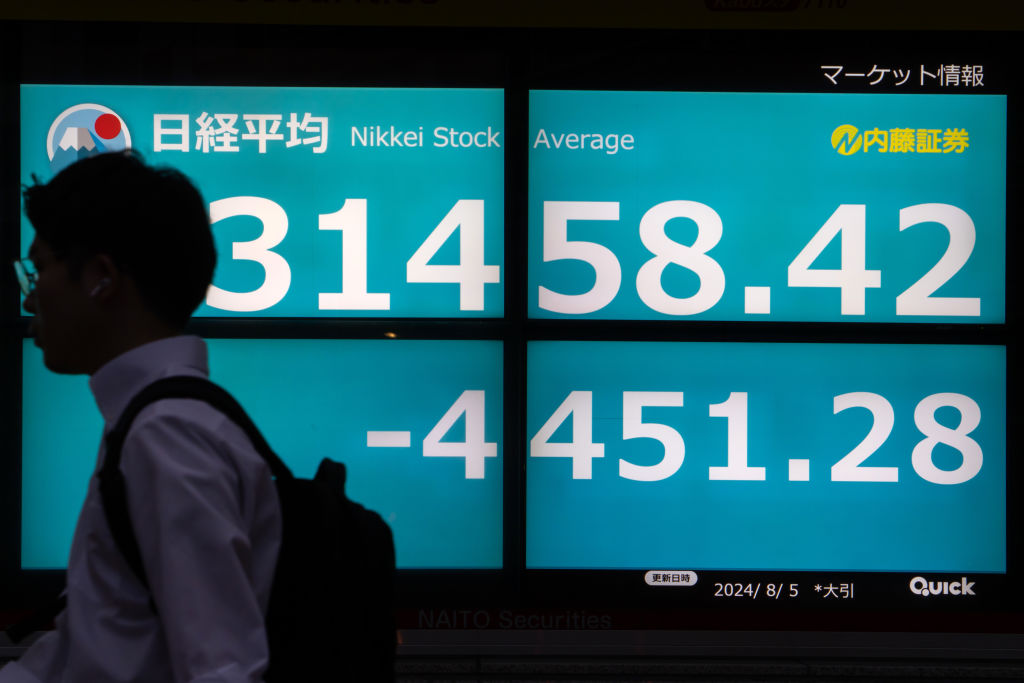
Your Morning Dispatchers are not financial advisers, but what we can say with some level of confidence is that reports of a worldwide economic collapse earlier this week were greatly exaggerated.
Though it seems clear that this week’s economic roller coaster does not automatically signify a recessionary crisis, Monday’s stock dump—and its complicated relationship to Asian markets—may aggravate existing uncertainty and low confidence among Americans about their country’s economic health in ways that could affect the election in November.
Stocks took a massive hit during a worldwide sell-off on Monday when all three major American market indices—the Nasdaq Composite, Dow Jones Industrial Average, and S&P 500—lost more than 2.5 percent in value, the latter two suffering their worst day since 2022. Early Monday, the Cboe Volatility Index, or VIX—otherwise known as Wall Street’s “fear gauge,” which measures the expected volatility in U.S. indices—notched its third-highest level since records began in 1992, with only the 2008 market crash and the beginning of the COVID-19 pandemic ahead of it. Across the Pacific, Japan’s Nikkei 225 index had its own, even more severe, case of the Mondays hours before Wall Street’s opening bell, dropping more than 12 percent in Tokyo’s worst crash since 1987.
While Monday’s sell-off-palooza made us check our 401(k)s with gritted teeth once or twice, it also exacerbated fears that a dreaded economic recession—usually defined by two consecutive quarters of GDP decline—as we reported Monday, was in the offing after last Friday’s disappointing U.S. jobs report saw the July unemployment rate surprisingly rise to 4.3 percent from June’s 4.1.
However, the world economy’s terrible, no good, very bad day did not extend into the rest of the week. International markets rebounded significantly on Tuesday, with all three aforementioned Wall Street indices partially regaining lost ground while the Nikkei 225 soared more than 10 percent. U.S. markets slightly tumbled on Wednesday, but nowhere near as dramatically as earlier in the week.
What exactly caused prices to tank on Monday? A good rule of thumb—as analyst Noah Smith put it—is that “nobody really knows why stocks go up or down, even though everyone pretends to know.”
Still, there are some speculatory indicators. In addition to Friday’s lackluster U.S. jobs report, the Federal Reserve decided against cutting interest rates last week from their current target range of 5.25 to 5.5 percent. Ironically, Fed Chair Jerome Powell told the media on July 31 that America’s central bank may lower rates “if the labor market were to weaken unexpectedly.” When Powell’s comment manifested itself in the jobs report, investors could have overreacted to fears a recession was around the corner in addition to worries that the Fed had waited too long to cut rates in order to spur economic growth. That interpretation prompted some economy-watchers to call for an emergency, 75-basis-point cut before the Fed’s next scheduled meeting in September, though it’s an unlikely prospect.
While that is one reasonable theory, another likely contributor to Monday’s sell-off was a complicated reaction to Japan’s rising interest rates by serious investors, such as hedge fund managers, who use a tactic called “carry trading” to bolster their returns.
Investors always want a bigger return on a stock purchase, and carry trading is one way to do that.
How? Foreign currency. If an investor wants to buy a stock that is sold in his domestic currency—in this case, the American dollar—he can instead borrow in a weaker foreign currency with a lower interest rate, like the Japanese yen. The hope is that once he sells that stock and pays the foreign interest, he will end up with a larger profit than if he’d bought the stock with the Yankee buck.
Japan, for years, has been a carry trader’s paradise: It’s one of the only developed countries to offer near-zero interest rates. Last week, the Bank of Japan lifted rates off the floor to 0.25 percent. By way of comparison, interest rates in the United Kingdom are currently at 5 percent and 4.25 percent in the Eurozone. Plus the yen is cheap against American currency.
But when a foreign country raises interest rates, like Japan has over the past few months, its currency surges against the dollar and carry trading starts to lose efficacy. As a result, investors look for a way out by selling assets.
This seems to be what happened on Monday, primarily affecting the Japanese and American markets. However, as evidenced by net upward movement since, the Great Sell-Off of 2024’s aftermath has not left a permanent mark—though the carry trading strategy may find itself out of vogue until Japanese interest rates and the yen fall again.
Whatever the reason(s) for Monday’s mini-panic, Ryan Young, a senior economist at the libertarian Competitive Enterprise Institute (CEI), told TMD a stock slide is “meaningless” in the face of positive economic news. “Any employment rate under 5 percent is usually pretty good. That used to be the definition of full employment,” Young said. “[The U.S. economy] grew by 2.8 percent last quarter, 1.4 the quarter before, and 5 in last year’s third quarter.”
Monday’s crash is also small potatoes when compared to recent stock slumps. At the start of the COVID-19 pandemic in March 2020, the Dow dropped more than 2,000 points on three separate days, taking months to recover. And while the 2008 Great Recession stock crashes never slumped more than 1,000 points, the market lost more than 7 percent of its value on certain days.
But, hypothetically, if the U.S. were to enter a full-fledged recession, the impact would likely be minor compared to 2020’s pandemic crashes and the Great Recession. Today, fewer Americans face debilitating debt caused by unaffordable mortgages—as was the case in 2008—making it easier for people to weather the storm of a slower economy. As a result, “[economic] downturn is less scary” according to the Manhattan Institute’s Allison Schrager.
But just because the slump may not matter in a strictly numerical sense, and any potential recession may not entirely cripple the U.S. economy doesn’t mean that the—forgive us—vibes aren’t bad. A May Guardian poll shows more than half of Americans erroneously think the country is in an economic recession. In addition, consumer confidence has stagnated in the past two years as Americans continue to express concerns over inflation even as price growth has slowed in recent months.
The uneasy economic feeling gives former President Donald Trump an in to attack his opponents on their handling of the economy. The former president took to Truth Social on Monday, arguing the “KAMALA CRASH” would kick start the “GREAT DEPRESSION OF 2024.” It may be a politically savvy move, as long as you follow political strategist James Carville’s eloquently stated “it’s the economy, stupid” rule about what issues matter most to voters.
A Pew poll earlier this year lists “strengthening [the] economy” as a top political concern among nearly 75 percent of Americans heading into November. Another Pew poll from May names inflation as the biggest problem facing the country today. If Americans bring their doom and gloom about their country’s economic position into voting booths, Democrats will likely be the ones to suffer to Trump and other Republicans’ advantage.
Democrats know this all too well. “We cannot win if people think we’re headed into a recession,” one Democratic National Committee member told Politico on Tuesday in reaction to Monday’s events.
However, CEI’s Young told TMD that he does not suspect Monday’s crash will ripple until November. “I don’t think the downturn will have any bearing. I think people will forget about this in a week or two,” Young said. “But if there is another [crash] closer to the election, then that may matter.”
Worth Your Time
- In an essay for Persuasion, (recent Remnant guest) Jonathan Rauch penned a tour de force defense of liberalism—the political philosophy, not the left-wing ideology—and charted a path to its redemption. “Why is liberalism so widely challenged and attacked, and so defensive and self-doubting, when it has so much to brag about?” he wrote. “Increasingly, I have come to think we must look for an answer not just in liberalism’s failures—though there certainly are some—but in liberals’ failure of nerve. … We should cop to our excesses of secularism, individualism, and consumerism. Yet we also need to stop taking it on the chin from critics who have nothing concrete to offer except failed nostrums. … When we are lectured that liberalism dissolves faith, tradition, community, and family, we should respond that no other social arrangement offers remotely as much room to freely—and thus virtuously—practice our faiths, sustain our traditions, and build our communities and families. When we are lectured about the hollowness of modern consumeristic life and the absence of meaning, we should ask our critics to look in the mirror and see if they are doing what they might to create meaning for themselves and others. When post-liberals and anti-liberals attack liberalism to deflect attention from their own moral and political deformities, we should not hesitate to call them out.”
- Could Israel be conducting its war in Gaza differently? Better? “The recent assassination of Hamas leader Ismail Haniyeh naturally prompted a number of reactions that reflect some combination of bad faith and ignorance,” former National Security Council member Michael Shurkin wrote for his Pax Americana Substack. “The key thing to understand are the differences between targeting a single point at a known location and the use of firepower in combat, especially in an urban setting in which the enemy has deliberately placed himself among or literally beneath civilians. … The more careful one is to limit firepower to the absolute minimum and target precisely, the more likely one is to suffer casualties. … Indeed, the safest way to ensure zero casualties on one’s own side is to stand back and blow everything up. Israel could nuke Gaza. Or carpet bomb it. Or drop large thermobaric weapons. … Israel could, but does not. Israel could commit genocide, but does not. One consequence is that the IDF has suffered relatively heavy casualties.”
Presented Without Comment
ABC News: Despite New Criticism, Trump Told [Minnesota Gov. Tim] Walz in 2020 He Was ‘Very Happy’ With His Handling of George Floyd Protests
At the time, Trump expressed support for Walz’s handling of the protests, according to a recording of a phone call obtained by ABC News—telling a group of governors that Walz “dominated,” and praising his leadership as an example for other states to follow.
“I know Gov. Walz is on the phone, and we spoke, and I fully agree with the way he handled it the last couple of days,” Trump told a group of governors on June 1, 2020, according to a recording of the call, in which he also called Walz an “excellent guy.”
“I was very happy with the last couple of days, Tim,” Trump continued. “You called up big numbers and the big numbers knocked them out so fast it was like bowling pins.”
Also Presented Without Comment
Axios: Gov. Tim Walz Doesn’t Own a Single Stock
Also Also Presented Without Comment
Wall Street Journal: The Seine Is Gross, but Swimmers Have a Solution: A Can of Coke
It might seem odd that some of the fittest people in the world would reach for a sugary soda after taking a dip in a polluted river. But among open-water swimmers, there’s a popular tip that has been passed down through the generations: The best way to stave off infection from whatever might be living in the water is good, old-fashioned Coke.
In the (Olympic) Zeitgeist
American runners just keep finding some secret gear: Quincy Hall pulled out a come-from-behind stunner in the 400-meter race on Wednesday to beat the U.K.’s Matthew Hudson-Smith to the gold medal by mere hundredths of a second.

Toeing the Company Line
- In the newsletters: The Dispatch Politics team checked in on the Democratic reaction to the selection of Minnesota Gov. Tim Walz as Kamala Harris’ running mate, Scott explored (🔒) new polling that shows Americans are more bullish on free trade than conventional wisdom suggests, Nick highlighted (🔒) Trump’s increasingly erratic behavior of late, and Jonah argued (🔒) the “wretched” Nike ad glorifying cruelty is bad, even if it’s not political.
- On the podcasts: Sarah and David discuss the antitrust decision against Google and Maryland’s assault weapons ban on Advisory Opinions and Walter Russell Mead, a senior fellow at the Hudson Institute, joins Jonah on The Remnant to talk foreign policy and political theory.
- On the site: Tom Zoellner points to Gila County, Arizona, to highlight the perils of Democrats abandoning rural America and Noah Chauvin reviews The Quiet Damage, a book about the QAnon conspiracy theory.
Let Us Know
How concerned are you about the market slump earlier this week? Have you made any changes to your investment strategy in recent days?



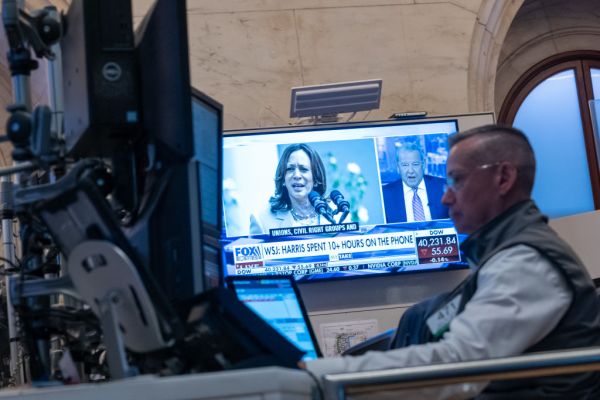
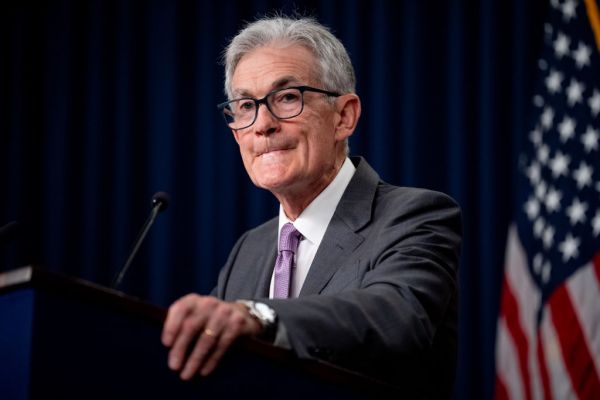
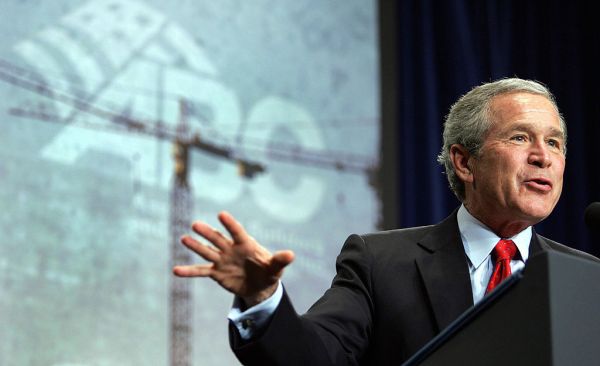

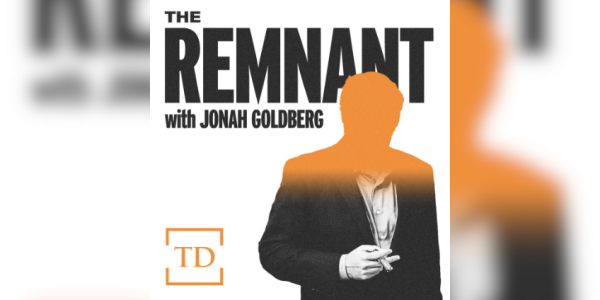


Please note that we at The Dispatch hold ourselves, our work, and our commenters to a higher standard than other places on the internet. We welcome comments that foster genuine debate or discussion—including comments critical of us or our work—but responses that include ad hominem attacks on fellow Dispatch members or are intended to stoke fear and anger may be moderated.
You are currently using a limited time guest pass and do not have access to commenting. Consider subscribing to join the conversation.
With your membership, you only have the ability to comment on The Morning Dispatch articles. Consider upgrading to join the conversation everywhere.